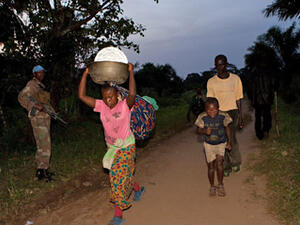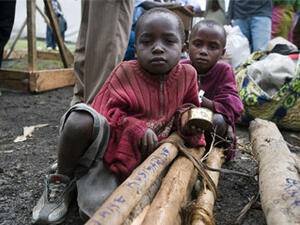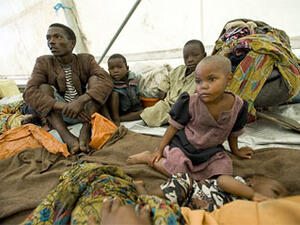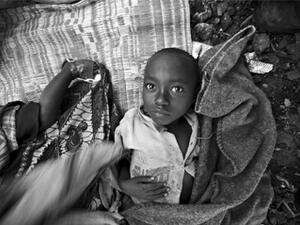DRC: Rwandans asking to be repatriated
DRC: Rwandans asking to be repatriated
A growing number of Rwandan civilians are emerging from remote areas of the eastern Democratic Republic of the Congo (DRC) seeking to repatriate. We are increasing our number of trucks and opening a new transit centre in Bukavu, capital of South Kivu province, that can accommodate up to 500 people.
This morning, our team in Bukavu plans to repatriate more than 200 civilians to Nyagatare, a reception camp in Cyangugu in Rwanda. Another 280 civilians are expected in Bukavu from Hombo, some 400 kilometres north, later today. We are moving 200 to 250 Rwandan civilians a day from Hombo. Road conditions mean our trucks need more than 10 hours to reach Bukavu.
The Rwandan civilians, mainly women and children, say that they are returning home willingly. Some say they were told by their leaders it is time to return home. They are generally in good health, although visibly tired after long walks and truck journeys from UNHCR assembly points to Bukavu.
They are most likely escaping a joint Rwandan/Congolese military offensive against the FDLR (Democratic Forces for the Liberation of Rwanda) militia has continued to grow in recent days. So far this year our teams in the South and North Kivu provinces have assisted 1,417 Rwandan civilians to return home. We expect the return of thousands more Rwandan civilians, some of whom fled to the DR Congo after the Rwandan genocide in 1994.
Many of those being assisted to repatriate from Bukavu are arriving from Walikale, a territory in neighbouring North Kivu province with a significant presence of FDLR rebels. Some say that they walked for two days from their villages to reach one of the six assembly centres set up by UNHCR in South Kivu. Hundreds more Rwandan civilians are awaiting UNHCR transport.
Former FDLR combatants wanting repatriation are presenting themselves to the UN peacekeeping mission MONUC that is also responsible for their disarmament, demobilisation, repatriation, reinsertion, and reintegration.
Meanwhile in Uganda, we started to move the first group of 594 Congolese refugees from Matanda transit centre, near the town of Ishasha on the Uganda-DRC border, to Kyangwali settlement, 420 kilometres north-east. After Nakivale refugee settlement reached its capacity of 42,200 refugees, Ugandan government designated Kyangwali as the next settlement area for the newly arrived Congolese refugees.
It takes more than 10 hours to reach the settlement. Kyangwali is an old settlement with a capacity of 23,000. At present, there are some 13,500 refugees - 7,600 Congolese and 5,700 Sudanese. UNHCR is expecting to relocate most of some 8,000 refugees now at Matanda in the next eight weeks. We are scheduling two relocation convoys per week, each taking some 600 refugees to Kyangwali.
On average 1,200 Congolese refugees arrive in Uganda every week; 4,800 were registered by UNHCR in January. Most are women and children who fled from Buganza, Nyamirima and Ishasha areas in the North Kivu province in the neighbouring DRC. Since last August some 41,000 have crossed into Uganda, where we organize transportation to the nearest transit centre. The UNHCR operation in Uganda assists more than 155,000 refugees.








